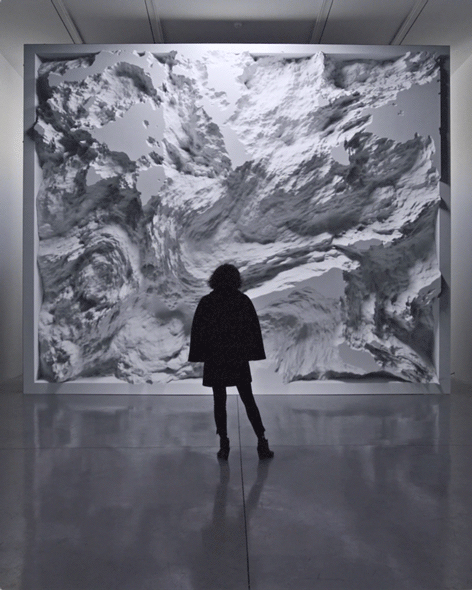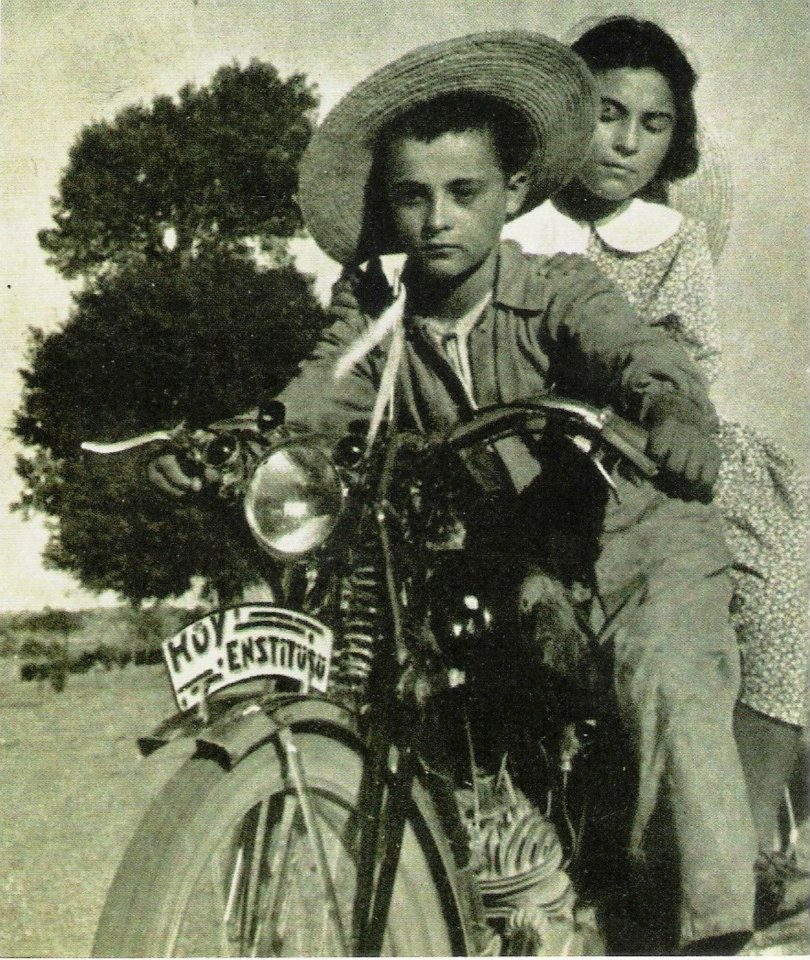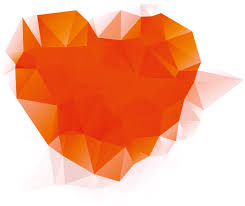Mahan Doğrusöz: I want to start my interview with the changing condition of women in Iran after the Islamic revolution? How did the Islamic revolution in 1979 change the status of women?
Sohalia Sharifi: Before answering your question I would like to make a correction about what you call “Islamic revolution”. I think this is one of the most common misconceptions of 1979 revolution in Iran. Iranian people who started a revolution were not by any means going to have an Islamic revolution. All the demands and slogans and mottos of that revolution show that people took to the streets to fight for a better and freer life. They wanted “Food, Shelter and Freedom”. The fact that our revolution was hijacked by a reactionary and backward movement called political Islam who brutally crashed those who wanted a better life and stained the revolution with blood does not make it an Islamic revolution.
Coming back to your question, As the Islamists in Iran took over the revolution and crept their way to power women were their first target. One of the very first laws laid down by Khomeini was the compulsory veiling for women and then eventually other laws came in and so women lost everything, every single right that they had. They officially became second class citizens completely depending on their male guardians. They became somebody’s daughter, somebody’s wife or somebody’s mother whose main duty in life was to serve these male guardians and their families. Women in Iran have no right of divorce or custody of their children; they can not travel abroad without the permission of their male guardians, they are considered adults at the age of 9 and are legally condemned to a life long of sexual abuse by their husbands, they can be somebody’s second or third or even forth wife, they will not receive the same amount of inheritance as their brothers and in front of a court of law two women’s testimony equal one man’s and so on….
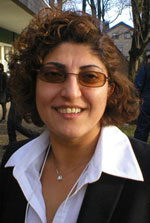
Sohalia Sharifi
Mahan Doğrusöz: Another point of extreme curiosity for me was the predictability of the changing condition of women after the Islamic revolution of 1979. We have this impression in Turkey that even the women who supported the Islamic revolution in 1979 never predicted that it would mean the loss of status, freedom and rights for women. Is our perception in Turkey true?
Sohalia Sharifi: We never thought we would end up with an Islamic government. Most of us took revolution as a way out of the chains that our patriarchal society had put on us for so many years. A lot of young girls and women roaming the streets shouting at the top of their lungs felt free for the first time in their lives, they felt that they were able to challenge a great power and demand a better life. They wanted to be taken seriously; they were sacrificing their lives like their male revolutionaries and they wanted to be seen as equals. Those days were great. None of those young women running to the demonstrations, glowing radiant with happiness and freedom predicted that their revolution would be hijacked by a reactionary power and they would end up in mobile prisons with no rights. Even women who supported the Islamic groups never predicted things to go as far as this.
It is, however, worth mentioning that Iranian women never gave in to the new oppressors easily. They have refused to become victims and have staged a serious war against this government right from the very beginning, a war which has lasted to present day. Women have fought in every corner of their lives to make sure that they are not reduced to sexual slaves and reproduction machines. Despite government’s preaching that women must stay at home and play mothers and wives, women have gone out and equipped themselves with skills and have tried to find jobs and secure an independent life in the society. In spite of government’s policy to limit university subjects for women, they make up 60 per cent of higher education students. The Islamic government was planning a Taliban like status for women in Iran and one look at the Iranian society shows how far it had been defied and even defeated by women.
Mahan Doğrusöz: What do you think Turkey can learn from the Iranian experience? Turkey is going through a very strong Islamisation period with the rise of political Islam. Secularism -which is to me the pillar of all equality and freedom for women – is under serious threat. What does the “sharia law” mean for women and how is patriarchy “flirting” with the sharia law to oppress women? I think Turkey needs your examples on this issue.
Sohalia Sharifi: Iran is a great example of how Islamic and sharia laws affect women’s lives in every single way. Sharia allows men to rape girls as young as 9 in the name of marriage, it allows horrific punishments such as stoning to take place in twenty first century, it deprives women from most basic human rights and justifies a gender apartheid. Turkish society (mainly the secularist movement) in my view has been great in fighting against any progress attempted by the Islamists. This is an important fight that must be won and we all have to support it. I remember when I lived in Turkey, I was so proud of the way young progressive people passionately fought and organised themselves. I believe that even though in some ways it seems that it is gaining more power, political Islam is no longer able to rise any more. The situation in Iran and Syria and even the events of Egypt and Tunisia prove that what we know of political Islam from the years 1979 and 1980s is getting more and more out of date. Despite their promises that they will be a very moderate kind of Islam in Egypt, they still have to fight everyday to make people to submit to them. The Turkish kind of “Moderate Islam” has become a more suitable alternative for the western governments to support when their puppet dictators are no longer tolerated by people. So it is important for Turkish people to understand the international position of political Islam and believe in its inevitable fall and so be confident in their fight against it and for secularism.
Historically it is the rise of patriarchy that results in the emergence of “God the father”, who is predominantly male and misogynist. Prior to Judaism and Christianity and Islam the three major monotheist religions, we still have goddesses being praised for giving birth to the earth and nature and universe. This shows the status of women as gatherers and growers of food and naturally the main bread winners of the family and the tribes. As we move away from this stage and hunting and war become more and more necessary for small societies to survive, male dominance takes over and women are pushed back. In order to explain this situation and justify the new system, a new kind of religion and God had to be born and the old goddesses had to fall. So it is very obvious why in most societies of today we see a great comradeship between patriarchy and religion. This two go hand in hand.
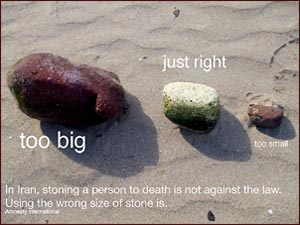
Mahan Doğrusöz: What are your personal views on the veiling of women? In Turkey, we are going through “hysteric” times where a growing number of women are “fetishising” veiling, glorifying it as a symbol of freedom. I am personally struck my the irony of the zeitgeist in Turkey as a woman raised in a Kemalist family with women who have not veiled themselves for the last three generations. I perceive that veiling is used as a tool to oppress and control women’s body and sexuality in Iran rather than an independent choice for women. In Satrapi’s famous book: Persepolis, veiling which was originally desired by women turns against women as an oppressive tool of the sharia law. How do you see this issue? How are women in Iran reacting towards veiling?
Sohalia Sharifi: I believe that no matter what its original reason (which I believe was also repressive!) Veil today and in the last 30 odd years has been more like a flag representing a political movement. The reason that Islamists in the world insist on veiling women and most women who support this movement take it up by choice is because they try to pass on a message. They try to prove that Islamic movement is on the rise and what better way to show it than by marching more and more veiled women on the streets of Middle East and Europe.
In Iran, veiling has been a major issue since the coming to power of the Islamic regime. On 8 March 1979 after Khomeini’s fatwa on compulsory veiling for women, thousands of women took to the streets shouting that “we have not staged a revolution to go back in time” and this was the first massive demonstration against the new government and it marked the beginning of a war between women and the government. Women refused to take the veiling by choice as they correctly thought it was a symbol of their enslavement and the government had to go to extreme measures to keep the veil on women’s heads including pinning (literally) the scarves to the foreheads and throwing acid on the made up faces or cutting bare legs with sharp blades. For the past thirty three years the government knowing well that without the veil there would be no Islamic government, has done whatever possible, be it propaganda or force or even persuasion methods to make women wear the veil. They spend thousands and millions on keeping “Special Forces” on the streets to either warn improperly dressed women or arrest them and fine them or torture them. They have sent “presents” consisting of proper Islamic veil to schools and colleges, they have awarded women who have set a “good” example of proper veiling and so on. Listening to the senior mullahs on most friday prayers, you would realise how defeated they feel in this particular field of war against women.
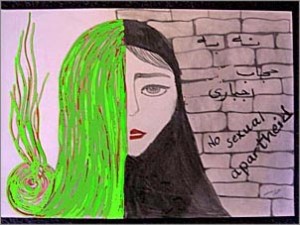
Mahan Doğrusöz: How do you interpret the “dread of women” in Islamic countries? what is this fear of the feminine and the female in all its representations? what is this obsession with women as the source of all evil? As a psychologist, I have very deep psychoanalytic interpretations of this issue, how do you see this issue yourself?
Sohalia Sharifi: Obviously you have to find theories and presentable ideas in order to oppress a major group of society and to justify the discrimination and injustice towards them. So the main religions of the world had to bring women down, turn them into insignificant beings (made of the left rib of Adam) and link them with evil (she who made Adam eat the forbidden apple) to justify their oppressive situation. Women’s bodies are perceived to be “the devil’s playground” They are desired by men and so they turn men into sinners. As Mohammed says “when a woman enters a bath, the devil is with her” In order to prevent corruption of men, they must be covered and kept out of the sight of society. Women’s vagina is described in literature as an opening into which a man can disappear without a trace.
Mahan Doğrusöz: As a woman’s rights activist, what do you think are the biggest challenges you are facing in Iran. I observe that some Turkish women also identify with the aggressor and they become their “severe castrating super-egos” denying themselves to be free human beings with equal rights with men. Do you also observe this issue in Iran?
Sohalia Sharifi: In every kind of dictatorship there are those who identify themselves with their oppressors and stand in the way of their fellow oppressed to fight against the repression and bring changes about. If it wasn’t so liberty would have been a lot easier to come by. In Iran however, I believe the biggest challenge in front of us as women’s rights activists is the Islamic government and the Sharia laws. The majority of women in Iran are adamant to bring this situation to an end and built a better and more equal system. I think in this respect Iran has a unique situation. Unlike some other countries those women or men on the side of Islamists are not many. Women -even those who had some illusions about the Islamic government at the beginning- have had enough of the rule of Islam and are for change. The next revolution in Iran will be a lot more supported and marked with women and their demands and activities.
Mahan Doğrusöz: I also tend to observe that some female intellectuals and academicians are “on side of” Islamisation not only in Turkey but all across Europe seeing it as a resistance against the “oppressive modernity of the west” without realising how this is hurting women and will hurt them even more. Do you have a similar issue in Iran? What are your views on this issue?
Sohalia Sharifi: At the beginning of the revolution, we witnessed this tendency among some women but today we hardly see any of these tendencies as Islam in Iran no longer represents a liberating movement against the west. On the contrary many people see western values a progressive way forward.
Mahan Doğrusöz: Are you working with any of the women’s rights activists groups in Turkey or anywhere as in Islamic countries. Do you think that the collaboration is possible? Do you think that women all across Islamic countries have similar problems/issues that can facilitate this collaboration?
Sohalia Sharifi: I strongly believe that we are all fighting in the same ground against reactionary and misogynist forces such as Islamic movement and so we must unite and work closely together. This has been done to some extent across some countries and it should be a lot stronger and more visible.
Mahan Doğrusöz: What would you like to say to Turkish women whom I think are under the threat of rising radical Islam, a seriously challenged secular system, growing popularity of Islamic life style, rising popularity of veiling? What can Turkey learn from the Iranian experience?
Sohalia Sharifi: Islam and religion are not a way forward, they will not bring liberty and they will certainly not build a rosy society for women as Iranian example clearly shows. Tells you to cover yourself, perceives you as an inferior being and in so doing will not grant you any equal status and justice. I know a lot of people are not happy with their current situations and I totally support people’s struggle for a better world, but we must be aware of what we are fighting for and which forces we are supporting. It would be a harder fight if we overthrow one tyrant and end up with another.
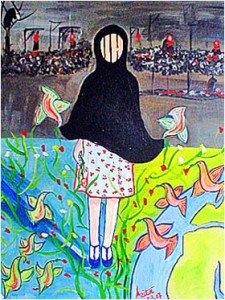
All images were taken from http://www.equalrightsnow-iran.com/
Sohaila Sharifi is a women’s rights and human rights activist. She was born in Iran and grew up under Islamic traditions, but soon after the coming to power of the Islamic republic, she joined the struggle against this regime and was forced to leave the country as she was no longer safe there. She has travelled to and lived a number of countries before settling in the UK where she continued her activities against the Islamic regime and for human rights. She was one of the founders of the International Campaign for the Defence of Women’s Rights in Iran. She has also been involved and active in other human and women rights organisations, including the International Committee against stoning and executions, ex Muslims of Britain, one Law for all and Equal Rights Now. Sohaila is a member of central committee of the worker communist party of Iran and presents a weekly TV show towards Iran with New Channel TV. Sohaila has also edited a couple of bilingual women’s journals including No Veil and women’s liberation.




